Diarrhea is a common and concerning issue for dog owners, frequently leading to veterinary visits. While many mild cases may resolve on their own, persistent or severe diarrhea should never be ignored. It’s often a symptom of an underlying problem, some of which require specific Prescription Medication For Dogs With Diarrhea to ensure a swift and safe recovery. Understanding the causes and effective treatments, especially those prescribed by a veterinarian, is crucial for your dog’s health.
In this in-depth guide, we’ll explore why prompt and proper treatment of dog diarrhea is vital, delve into the various types of medications available—with a special focus on prescription options—and provide vet-approved advice for effectively managing this uncomfortable digestive condition. Our aim is to equip you with the knowledge to make informed decisions with your vet, ensuring your beloved canine companion gets the best possible care.
Understanding Dog Diarrhea: Why Treatment Matters
Diarrhea in dogs is not a diagnosis in itself; rather, it’s a critical symptom indicating an underlying health issue. When a dog experiences diarrhea, food moves too rapidly through the digestive tract, preventing proper absorption of water, essential nutrients, and electrolytes. This results in loose, watery stools instead of the firm, well-formed consistency characteristic of healthy dog poop. Sometimes, you might even notice blood or mucus in your dog’s stool, signaling more serious concerns.
Beyond the unpleasant mess, diarrhea typically makes dogs feel miserable. More importantly, it can lead to severe health complications, primarily due to extreme fluid loss and subsequent dehydration. For instance, puppy diarrhea can be life-threatening because a puppy’s developing body lacks the reserves to cope with significant dehydration. Similarly, diarrhea in senior dogs or those with compromised immune systems poses a grave danger. Their systems are less robust, making them highly vulnerable to the debilitating effects of fluid and electrolyte imbalance.
Because diarrhea profoundly impacts your dog’s overall health and well-being, providing effective relief is essential. This helps to “reset” the digestive system, restore normal function, and address any underlying causes. While at-home remedies like temporary fasting, rest, and ensuring adequate rehydration might suffice for many mild cases, severe or pathogen-induced diarrhea often necessitates a veterinarian’s intervention and specific anti-diarrhea medicine. It’s always best to consult with your vet if you’re concerned about your dog’s digestive health or considering any form of tick and worm treatment for dogs that might also impact gut flora.
Types of Medications for Canine Diarrhea
There’s a wide array of dog diarrhea medicine options available, but it’s important to recognize that not all are suitable or equally effective. In fact, some human medications can be detrimental to your dog’s health. To clarify the differences and guide your understanding, here’s an overview of common over-the-counter (OTC) anti-diarrheal medicines, probiotic supplements, and the vital role of prescription medication for dogs with diarrhea.
Over-the-Counter (OTC) Anti-Diarrheals: A Word of Caution
You’ve likely encountered OTC anti-diarrheal medicines like Imodium, Kaopectate, and Pepto Bismol on pharmacy shelves. These are designed to relieve diarrhea and other gastrointestinal (GI) upset in humans. Many pet owners instinctively wonder, “Can dogs take Imodium?” or other familiar remedies from their medicine cabinet. However, the answer is usually a cautious “no,” or “only under strict veterinary guidance,” as these human medications can pose serious risks to your dog.
Imodium, for example, functions by slowing down food transit through the digestive tract. While effective for humans, it carries potential side effects for dogs, especially certain breeds like Collies, Shelties, and Australian Shepherds, who may have a genetic mutation (MDR1) that makes them highly sensitive to drugs like loperamide (Imodium’s active ingredient). Kaopectate and Pepto Bismol contain active ingredients like bismuth subsalicylate, which can coat and protect the intestinal lining. However, salicylates (similar to aspirin) can be toxic to dogs, potentially causing stomach upset, ulcers, or even more severe issues.
It is paramount to never administer these human medicines to treat your dog’s diarrhea without explicit veterinary approval! While canine Imodium might be used off-label in some specific cases, it absolutely requires professional input regarding dosage and potential risks. If your vet does recommend an OTC diarrhea medication, meticulously follow their dosing instructions and promptly report any concerns or changes in your dog’s health.
Probiotic Supplements for Gut Health
Your dog’s gut, much like our own, hosts billions of beneficial bacteria crucial for proper digestion, a robust immune system, and preventing harmful bacteria from overgrowing. Diarrhea often disrupts this delicate balance, depleting these “good” bacteria.
Probiotic supplements can be highly effective in helping to relieve dog diarrhea by replenishing beneficial gut bacteria. This re-establishes a healthy intestinal balance and promotes efficient digestion. While many human-formulated probiotic supplements are available, and generally won’t harm your dog, a probiotic specifically designed for canines is a superior choice. Humans and dogs possess different intestinal flora compositions, so a species-specific probiotic will provide your dog with the most targeted and effective support for their unique digestive system.
The Role of Prescription Medication for Dogs with Diarrhea
When it comes to addressing the root causes of canine diarrhea, prescription medication for dogs with diarrhea often proves to be the most effective solution. These medications are typically chosen to target a specific pathogen or underlying condition identified by your veterinarian. For instance, if your vet determines that intestinal inflammation is the culprit, an antibiotic like metronidazole might be prescribed. However, if the loose stools are caused by intestinal parasites, a broad-spectrum dewormer such as Panacur (fenbendazole) would be the appropriate course of action.
Additionally, veterinarians may prescribe dog-safe medications that mimic the action of some human OTC solutions but are formulated and dosed specifically for canine physiology. An example is diphenoxylate, an anti-diarrheal medicine for dogs that works similarly to Imodium by slowing digestion but is used under strict veterinary supervision to mitigate risks. These prescribed treatments are frequently considered the best diarrhea medicine for dogs, as they directly address the specific cause and severity of symptoms, often after diagnostic testing. For concerns about other parasitic issues, a vet might also discuss prescription flea medication for dogs or general flea tick and mite medicine for dogs as part of a holistic health plan.
 A sad-looking dog experiencing gastrointestinal discomfort, potentially from diarrhea
A sad-looking dog experiencing gastrointestinal discomfort, potentially from diarrhea
Top Prescription Medication for Dogs with Diarrhea (and Vet-Recommended Options)
While diarrhea can sometimes be the body’s way of expelling something harmful, and your veterinarian might occasionally advise allowing it to run its course, severe or persistent cases almost always require intervention. When an underlying health cause is identified, or the diarrhea is severe, your vet will likely recommend or prescribe specific anti-diarrheal medications. Here are several commonly recommended or prescription medications for dogs with diarrhea that vets typically consider:
Metronidazole (Flagyl)
Metronidazole, known by brand names like Flagyl, Metizol, Protostat, and Metrogel, is a powerful prescription antibiotic and antiprotozoal agent. This means it’s effective against both certain types of bacteria and protozoal parasites—two common culprits behind diarrhea in dogs. It’s typically administered orally and is prescribed when your vet confirms a bacterial infection or protozoal parasite as the cause of your dog’s diarrhea.
While generally safe when used as directed, metronidazole for dogs can, in rare instances, cross the blood-brain barrier and lead to neurological symptoms. Other potential side effects include nausea, fatigue, and loss of appetite. It is critically important to administer metronidazole exactly as prescribed by your veterinarian; never adjust the dosing or give it without explicit instructions.
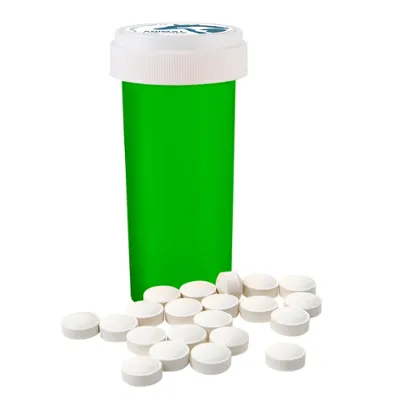 Packaging for Metronidazole, a common prescription medication for dogs with diarrhea caused by bacteria or parasites
Packaging for Metronidazole, a common prescription medication for dogs with diarrhea caused by bacteria or parasites
Proviable DC Capsules
While a probiotic, Proviable DC is frequently recommended or prescribed by veterinarians, especially in conjunction with other treatments for diarrhea. These capsules are designed to help restore normal levels of healthy gut bacteria, which are often depleted during episodes of diarrhea. The capsules contain seven species of live, beneficial bacteria. They are typically given once daily by mouth or as directed by your vet, playing a crucial role in re-establishing a balanced gut microbiome.
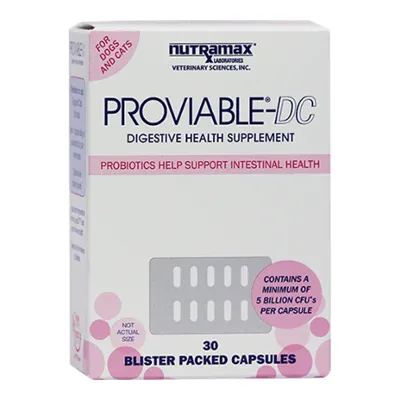 Proviable DC capsules, a probiotic supplement recommended by vets for dog diarrhea relief
Proviable DC capsules, a probiotic supplement recommended by vets for dog diarrhea relief
Proviable Forte Chewable Tablets
Similar to Proviable DC capsules, Proviable Forte chewable tablets are another vet-recommended probiotic supplement aimed at promoting optimal gut health in dogs. They contain the same beneficial bacteria found in the capsules and are administered once daily by mouth or as advised by your vet. These chewable tablets offer an alternative format for easier administration, contributing to a healthy digestive balance during and after bouts of diarrhea.
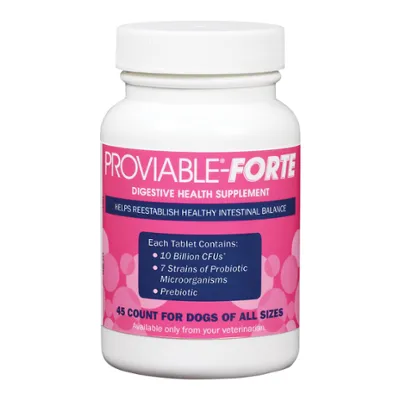 Proviable Forte chewable tablets for dogs, a probiotic to restore healthy gut flora during diarrhea
Proviable Forte chewable tablets for dogs, a probiotic to restore healthy gut flora during diarrhea
Rx Clay Powder
Rx Clay Powder is a veterinary-grade product that aids in diarrhea relief through a dual mechanism. Firstly, it effectively adsorbs toxins produced by harmful bacteria within the gut. This adsorption process binds the toxins to the clay, allowing them to be safely excreted from the body. Secondly, the clay promotes water reabsorption in the digestive tract, thereby reducing the significant fluid loss often associated with diarrhea. Because the body does not absorb the clay, the risk of overdose is minimal. It’s typically given as one scoop per 10 pounds of body weight, or as directed by your veterinarian.
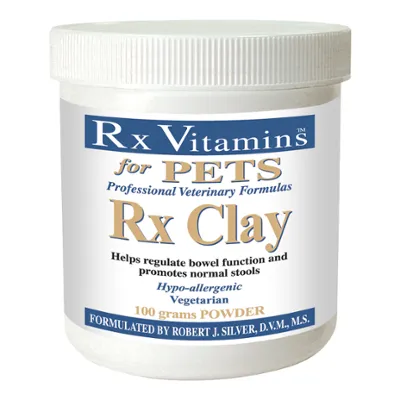 Rx Clay powder, a veterinary product for dog diarrhea that adsorbs toxins and aids water reabsorption
Rx Clay powder, a veterinary product for dog diarrhea that adsorbs toxins and aids water reabsorption
Endosorb Tabs
Endosorb tabs, also known as canine Endosorb, are chewable tablets designed to provide effective diarrhea relief by helping to restore normal stool consistency. One of the primary active ingredients, attapulgite, works by coating and soothing the irritated intestinal lining, reducing inflammation and discomfort. These tablets are administered orally every four hours, with the dosage determined by your dog’s body weight, strictly following your vet’s instructions.
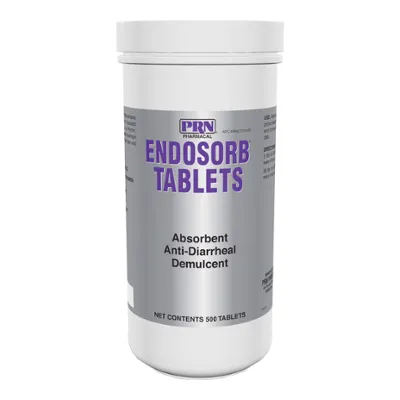 Endosorb Tabs for dogs, an anti-diarrheal chewable tablet with attapulgite to soothe the intestinal lining
Endosorb Tabs for dogs, an anti-diarrheal chewable tablet with attapulgite to soothe the intestinal lining
Nutrigest Capsules
Nutrigest capsules are formulated to assist in restoring and maintaining the critical balance of beneficial bacteria in the gut. Beyond this, they also work to repair the inflammation and irritation of the intestinal lining that often accompanies diarrhea. Key active ingredients include probiotics for gut flora support and glutamine, an amino acid vital for intestinal cell health and repair. Soothing ingredients like aloe also contribute to calming the inflamed intestinal lining. The capsules are typically given two to three times daily, with the specific dosage guided by your dog’s body weight and your veterinarian’s instructions.
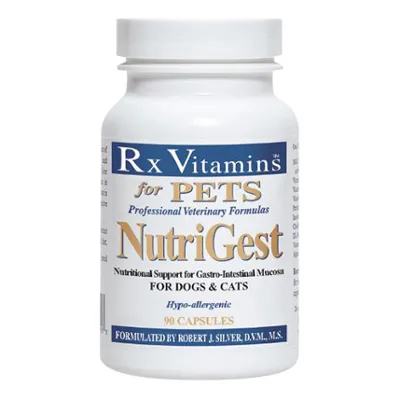 Nutrigest capsules, a supplement combining probiotics and glutamine for managing dog diarrhea and gut inflammation
Nutrigest capsules, a supplement combining probiotics and glutamine for managing dog diarrhea and gut inflammation
How Your Vet Selects the Right Prescription Medication for Dogs with Diarrhea
Choosing the most effective prescription medication for dogs with diarrhea is a nuanced process that always requires close collaboration with your veterinarian. Your vet may first want to conduct a thorough physical examination and potentially run several diagnostic tests. These tests could include fecal analysis to check for parasites or bacterial overgrowth, blood work to assess overall health and hydration, or even imaging like X-rays. These diagnostics are crucial for uncovering the underlying cause of the diarrhea, which directly dictates the most appropriate treatment.
Your veterinarian will meticulously consider several key factors before recommending a specific treatment plan:
- Cause, Severity, and Duration of Diarrhea: Is it acute or chronic? Is it related to dietary indiscretion, a bacterial infection, parasites, or a more serious systemic disease?
- Additional Symptoms: Is your dog also vomiting, lethargic, feverish, or experiencing abdominal pain? These co-occurring symptoms influence the urgency and type of treatment.
- Age: Puppies and senior dogs have different physiological needs and vulnerabilities, requiring careful consideration of medication choices and dosages.
- Overall Health: Any pre-existing medical conditions, such as kidney disease, liver issues, or allergies, will impact the suitability of certain medications.
It is imperative to follow your vet’s prescribed treatment plan exactly as instructed. If your vet determines that your dog requires prescription medication for diarrhea, they will recommend the most suitable option. As with treating any health condition, managing your dog’s diarrhea might involve some trial and error. Continuously monitor your dog’s symptoms and provide regular updates to your vet. Inform them promptly whether your dog’s diarrhea is improving, remaining unchanged, or worsening, as the treatment plan may need to be adjusted based on your dog’s response. They can also advise on preventative measures, such as appropriate flea and tick medicine over the counter options that are safe for dogs.
 Veterinarian examining a dog to determine the best prescription medication for diarrhea
Veterinarian examining a dog to determine the best prescription medication for diarrhea
Essential Tips for Managing Your Dog’s Diarrhea
Dealing with your dog’s diarrhea is stressful for both you and your canine companion. To increase the chances of a quick and successful resolution, here are a few essential tips:
- Do Not Wait to Start Treatment: As soon as you notice your dog has diarrhea, especially if it’s severe, bloody, or accompanied by other symptoms, contact your veterinarian. The sooner you address the problem, the faster your dog can be on the road to recovery and prevent serious complications like dehydration. This proactive approach is key, whether the solution involves home remedies or specific mange mite treatment for dogs if mites are contributing to overall poor health.
- Follow Your Vet’s Instructions Carefully: Whether your veterinarian advises specific home remedies, a dietary change, or a course of prescription medication, adhere strictly to their instructions. This ensures the best possible response to treatment and minimizes the risk of side effects or prolonged illness.
- Monitor Your Dog Diligently: Pay close attention to your dog’s symptoms, energy levels, appetite, and stool consistency. Notify your vet immediately if the diarrhea is not improving, if new symptoms develop, or if your dog’s overall health appears to be worsening. Your observations are invaluable to your vet in adjusting the treatment plan.
Frequently Asked Questions (FAQs) About Dog Diarrhea
When your dog has diarrhea, it’s natural to have many questions about its duration, potential accompanying symptoms, and safe treatment options. Here are answers to some common concerns.
How long is too long for a dog to have diarrhea?
Most mild, uncomplicated cases of diarrhea in dogs resolve on their own within 1 to 2 days with supportive care like a bland diet and plenty of water. However, if the diarrhea persists for more than 48 hours, is severe, or is accompanied by other worrying symptoms such as vomiting, lethargy, loss of appetite, or blood in the stool, you should contact your vet immediately. Prolonged diarrhea can lead to severe dehydration and indicate a more serious underlying health issue requiring specific prescription medication for dogs with diarrhea.
What should I give a dog with diarrhea and vomiting?
Dogs experiencing both diarrhea and vomiting often feel unwell and may refuse to eat. Given that both conditions can cause significant fluid loss, adequate hydration is paramount. Ensure your dog has constant, free access to fresh, clean water. Offer small amounts of water frequently if your dog is reluctant to drink large quantities. If you are struggling to encourage your dog to drink, or if vomiting prevents them from keeping water down, contact your vet immediately. They may recommend subcutaneous fluids or other interventions to prevent dangerous dehydration.
Is it safe to give human medications to dogs with diarrhea?
Generally, it is not safe to give human anti-diarrheal medications to dogs without specific guidance from a veterinarian. While some human medications might contain ingredients that could theoretically help, their active components can be toxic to dogs, even in small doses, or cause severe side effects. Furthermore, human medications are dosed for human body weight and metabolism, which differs significantly from dogs. These medications can also interact dangerously with other medications your dog might be taking. Always consult your vet before administering any human medication to your dog to ensure their safety and effective treatment.
